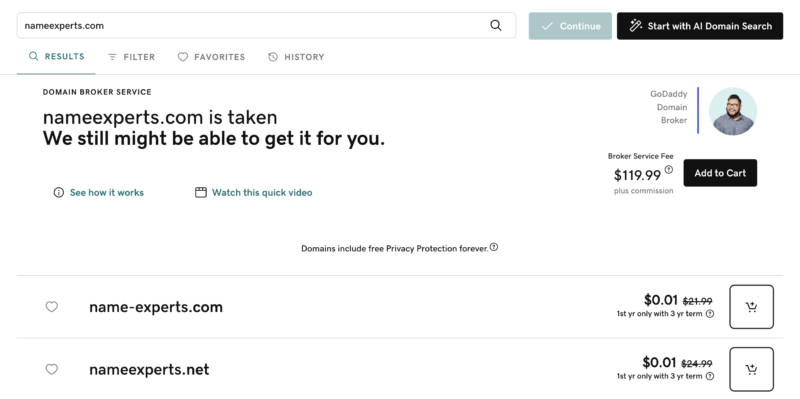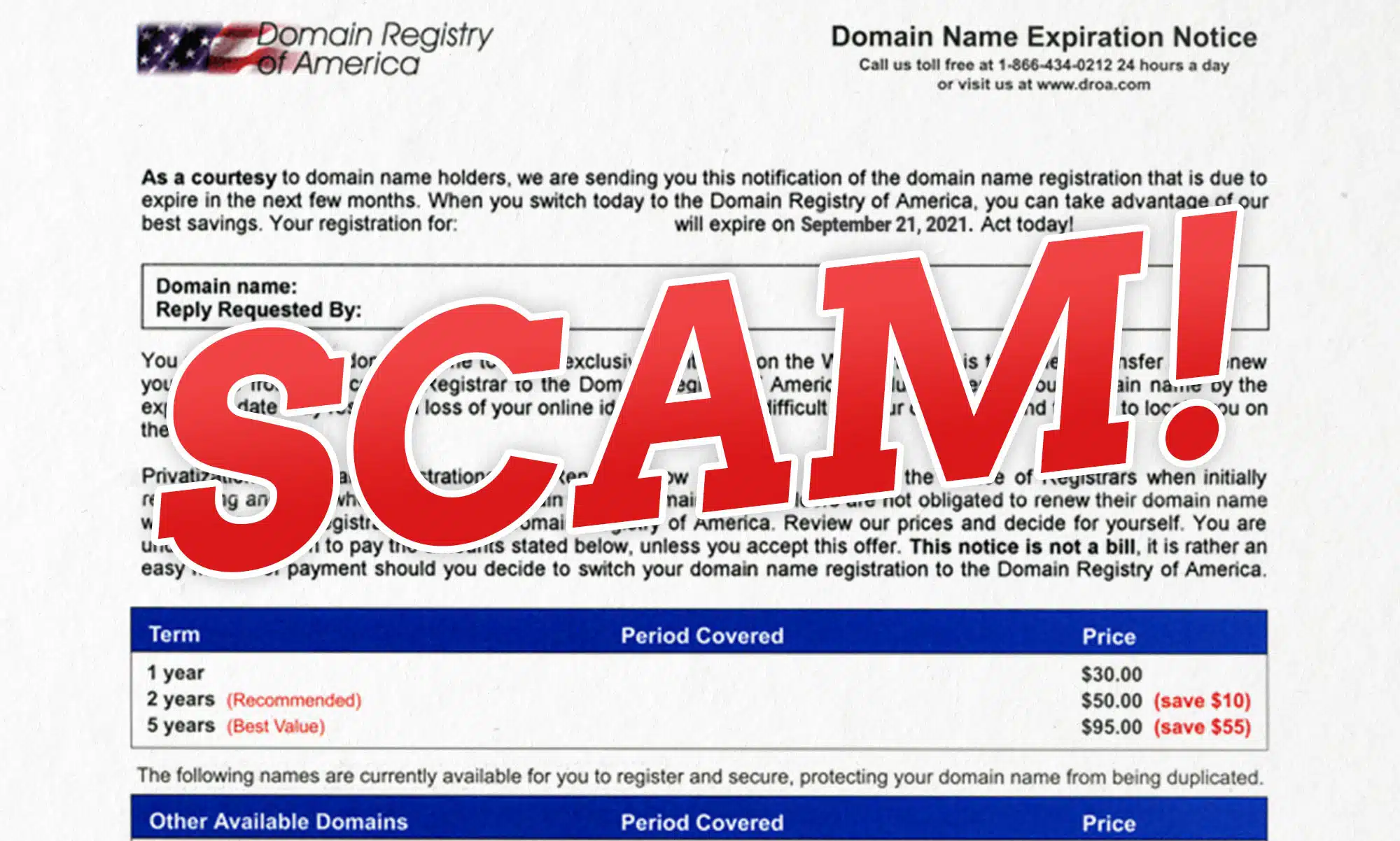GoDaddy is the world’s largest domain registrar, with over 90 million domain names registered and counting. Thanks to never-ending marketing, the average person likely thinks of GoDaddy when they want to buy a new domain.
It’s common for people to visit GoDaddy, type the domain they want to buy, and see that someone else has already taken it. But GoDaddy doesn’t leave the user hanging– it suggests an alternative domain name or advertises its domain broker service, as seen below:

The box on the right suggests an alternative domain to the one already taken, and the left shows a broker service and a See More button to click on to get additional information. But what exactly is the GoDaddy domain broker service, and how does it work?
This article will explain that.
GoDaddy Domain Broker service
Domain brokers are professionals who specialize in buying and selling domain names. They’re the internet’s version of real estate agents, connecting domain name buyers to interested sellers for a fee.
It’s common for people to think of a domain name they really want for their business but find out that it’s already registered. If you fall into this category, GoDaddy offers a domain broker service to help you acquire a domain name from its existing owner. If you pay for the service, you’ll be assigned a personal domain broker to reach out to your target domain name’s owner, negotiate a sales price, and facilitate the domain transfer. Your identity remains anonymous throughout this process.
However, there’s no guarantee of getting the domain name you want. If the owner insists on not selling, GoDaddy can’t force them to say otherwise; this is where it gets interesting. The GoDaddy Domain Broker Service fee ($119.99 per domain) is non-refundable, and your assigned broker has 30 days to negotiate a deal. You’ll forfeit the fee if 30 days lapse without your broker clinching a deal. But, if the broker successfully negotiates a deal, GoDaddy collects an additional 20% of the sale price before transferring the domain.
GoDaddy’s $119.99 non-refundable fee plus 20% commission is rather steep for small to midsize businesses. The commission is understandable, given that most domain brokers charge between 10% and 20%, but the initial non-refundable fee discourages smaller companies from using the GoDaddy Domain Broker Service. If you’re in this category, you’ll be happy to know you can choose alternative domain brokers that charge low initial fees or, if at all.
Name Experts is a good example of a domain broker service having reasonable fees. We can help you acquire premium domain names without hassles. Like GoDaddy, we find the target domain’s owner, negotiate a deal, and transfer the domain to you. To make things better, we don’t have GoDaddy’s 30-day limit, which can force you to forfeit significant fees.
Why should I use a domain broker service?
Privacy
A domain broker protects your privacy during negotiation. The owner won’t know you’re the one who is interested in their domain. All they know is that someone represented by the broker wants to buy their domain, and they negotiate directly with the broker.
Without privacy, domain owners can easily exploit intending buyers, especially when the buyer is a well-known company with significant funds. An opportunistic owner can hike their prices if they discover the buyer is a prominent company, but domain brokers shield their client’s identity to prevent this situation.
Cost-effectiveness
Domain brokers are skilled and experienced digital property appraisers. Based on their knowledge and past deals, they know the optimal price for a premium domain. In contrast, you likely don’t know the optimal price and could underbid the domain, causing the owner to reject your offer or overbid and get taken advantage of. Handing the negotiation to a domain broker helps you save money even when accounting for the broker’s commissions.
Transaction security and ease
A professional domain broker service makes buying a domain as seamless as possible. They handle the hectic negotiation process and arrive at a final price with the owner. Then, they handle the legal documentation required to take ownership of the domain. Lastly, the broker uses an escrow service to acquire a domain, escrow meaning the funds aren’t released until you confirm ownership of the domain.
Acquiring a premium domain name by yourself can be complicated and leaves you vulnerable to being cheated. However, domain brokers are experienced in closing deals safely and handling legal documentation in case of future disputes.
If you want to acquire physical real estate, you’ll offload the headaches to a licensed broker for a fee. The same applies to digital real estate– professional brokers make buying domain names painless.
Considerations for choosing a domain broker
Cost
Cost is a critical consideration when choosing a domain broker, as choosing one whose services you can afford is necessary. The main drawback of the GoDaddy Domain Broker service is the non-refundable $119.99 fee. GoDaddy customers must pay this fee whether the broker negotiates a successful deal, which can be daunting to a small business. There’s also a 30-day cap, after which customers forfeit their fee if no deal is formalized.
In contrast, some domain brokers charge only commissions, meaning you’ll only pay when a deal is successfully negotiated. Some charge initial fees that are refundable if no deal closes. No matter what, you can find a more cost-effective deal than GoDaddy’s in one of many alternative brokers.
Track record
You can evaluate a domain broker’s credibility by checking their past deals. What high-value domains have they acquired in the past, and what do customers say about them?
The good news is that most domain brokers provide testimonials and general information about past deals. At Name Experts, we’ve successfully closed over $90 million in domain name sales, including premium domains like Link.com, 20.com, and Connect.com.
Payments security
Domain name acquisitions involve sizable sums you can’t risk losing. Hence, a good domain broker must utilize a secure payment infrastructure for both buyers and sellers. Payments processing platforms like PayPal, Wise, and Square make it easy to pay the required fees. We’ve also mentioned online escrow services, i.e., a third party that holds the payment and only disburses it to the seller after you confirm receipt of the domain.
Negotiation skills
Domain brokers are salesmen at heart. An ideal broker needs ample negotiation and persuasive skills. Some owners may be reluctant to sell, but a skilled broker can convince them to change their minds.
Selling a domain name via a broker
Remember, a broker works for two parties: the buyer and the seller. You might own a valuable domain you want to sell but don’t know how to find a buyer willing to pay your target price. A domain broker helps you market the domain to prospective clients for a fee.
Name Experts helps businesses buy valuable domains and domain owners to find interested buyers. Don’t hesitate to contact us if you’re in either category.





